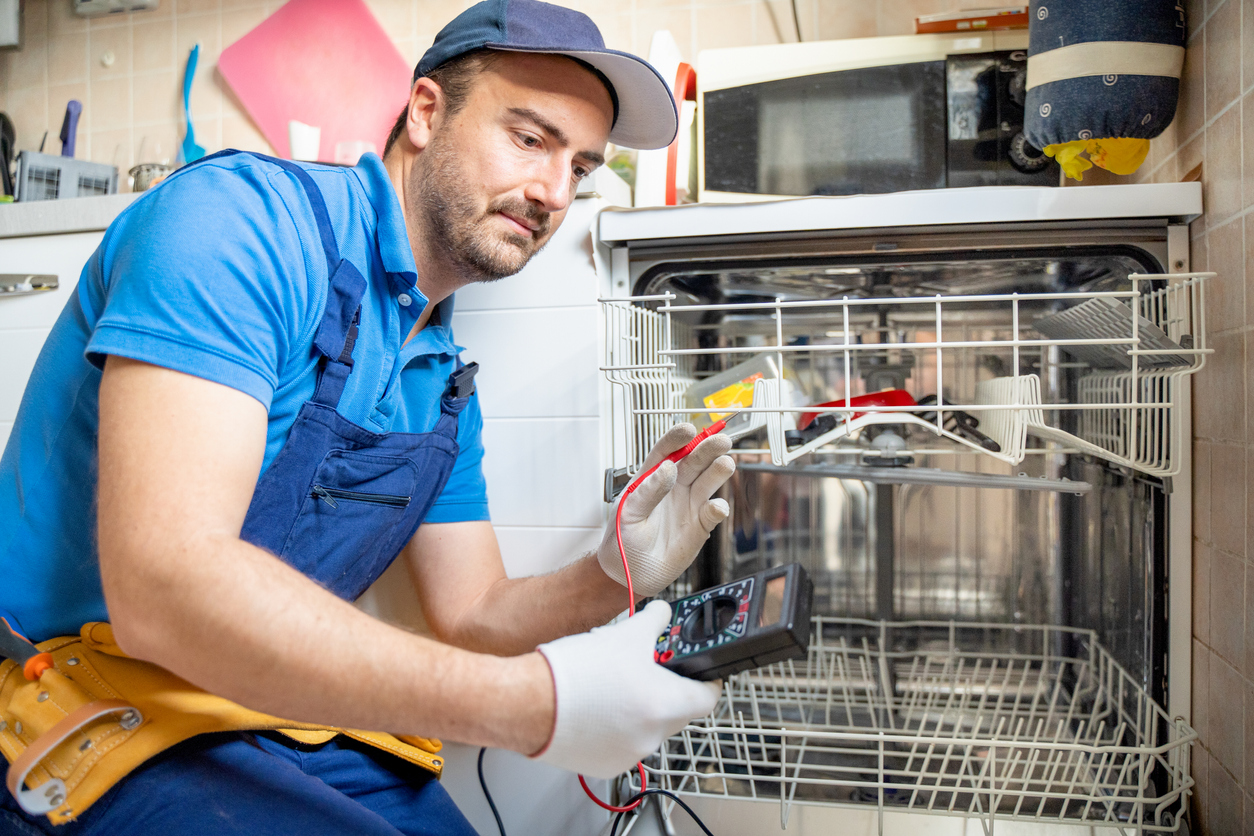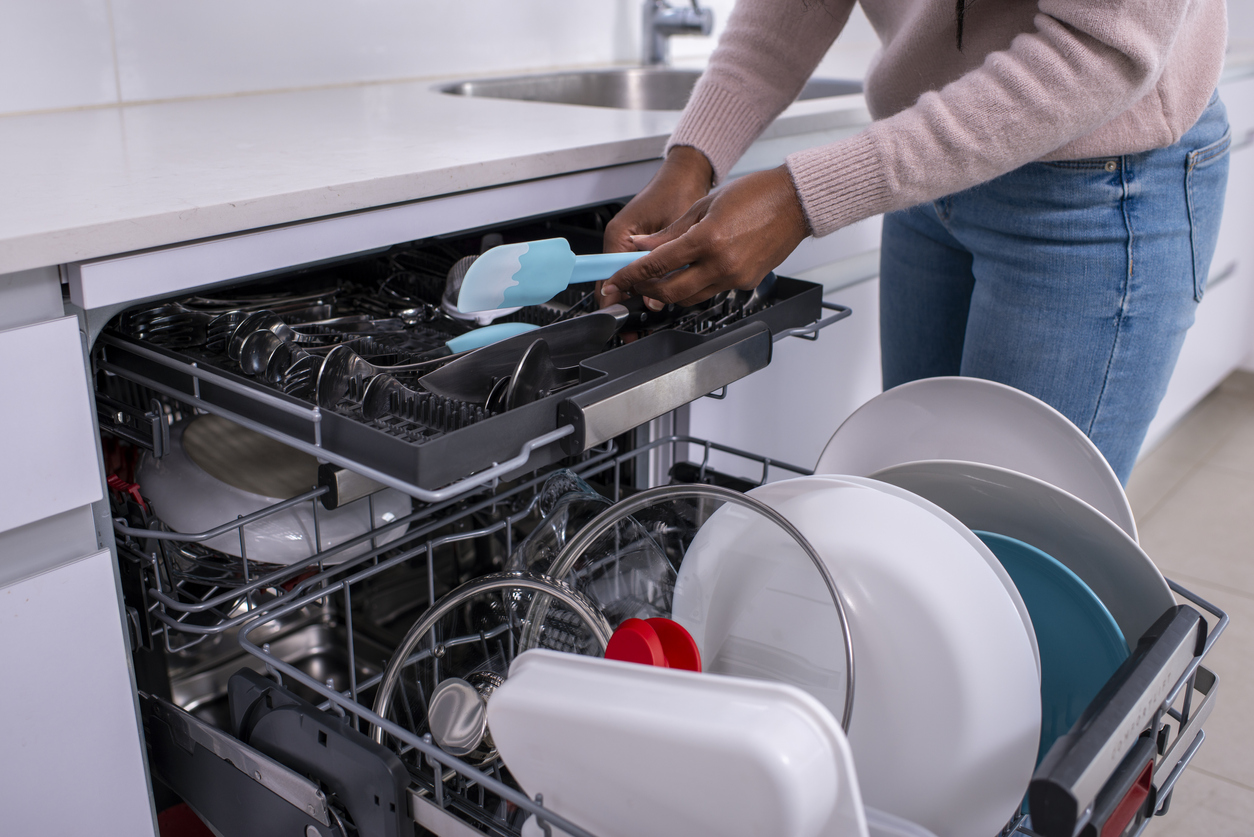

We may earn revenue from the products available on this page and participate in affiliate programs. Learn More ›
Q: There’s a big sale on appliances at the home improvement store, and since our dishwasher is so old, I think it’s time to invest in a new one. But who installs dishwashers? Do I have to do it myself, or can I hire someone?
A: Once homeowners have had a dishwasher, it’s one appliance they never want to give up, so it’s wise to get a new dishwasher before yours is out of commission. Hooking up a dishwasher seems like it should be an easy task—plug it in, connect the water, and you’re in business. Since dishwasher kits are sold at home improvement stores or online, it may seem as if anyone can take on the task. But there are many more steps involved, and if you’re not experienced with plumbing or electrical work, you could be opening a can of worms bigger than you anticipated. So who installs dishwashers? Keep reading to find out who you need to hire.
Plumbers can replace a dishwasher or install a new one.
As with anything in the home relating to water, a plumber is the go-to professional to hire for dishwasher installation. There are specific codes regarding household plumbing that must be adhered to, and plumbers work with these codes daily. Homeowners who try to learn the codes may misinterpret them, leading to potential issues down the road. For example, if you plan to sell your home but have an out-of-code dishwasher installation, this will be uncovered during the home inspection, and you may have to pay to have the dishwasher reinstalled.
Having a plumber install a new dishwasher also minimizes the risk of any leaks resulting from improper installation. A leaking dishwasher not only means that you’ll waste water and pay more on your bills, but it could also damage your floor and surrounding cabinetry—leading to more expensive repairs.
An electrician may be needed if an electrical panel needs to be installed or upgraded.
Electrical codes require a dishwasher to be on its own circuit. If you’re installing a new dishwasher in a home for the first time, the home may need to be wired or rewired in order to create a dedicated circuit. Many states require electrical work to be done by a licensed electrician, so you may need to hire another professional in addition to a plumber. Homeowners with older electrical systems may also take the opportunity of replacing a dishwasher to upgrade its circuit.

The average dishwasher lasts for 12 years.
Dishwashers put in a lot of hard work day in and out, so they typically aren’t going to last as long as other kitchen appliances like ovens or refrigerators, which can last 20 years or more. Dishwashers have an average lifespan of 9 to 16 years, depending on how well homeowners maintain them, the quality of the parts, and how often they’re used. Believe it or not, while running a dishwasher once or twice every day can wear it out, not running the dishwasher enough can also shorten its life. It’s best to run a dishwasher regularly, but not necessarily every day.
Dishwasher installation costs, along with the unit, cost an average of around $1,000.
The cost to install a dishwasher includes the dishwasher unit, supplies, and labor. The average cost of a dishwasher itself is between $300 and $1,000. Dishwasher costs vary significantly based on the model and its features. Labor for installing a dishwasher is often just under $200, although homeowners could pay as little as $70 for the installation. The best dishwasher is the one that meets your budget and capacity needs. Some homeowners may prefer all of their appliances to be from the same brand, so if you have a GE refrigerator, microwave, and oven, you may want to consider one of the best GE dishwashers as well.
New dishwashers have multiple advantages over older models.
While some homeowners may resent the idea of getting a new dishwasher, whether for having to shell out a large sum of money or just the inconvenience of purchasing and installing a new appliance, there are benefits to getting a new one. As technology advances, dishwashers can use less water and energy than older models, which is good for the environment and your wallet. Dishwasher jets are more powerful than they used to be, which makes for more efficient cleaning and less need to pre-clean or soak dishes. Newer dishwashers are often quieter than older ones, so you can run them any time of day without causing a disturbance.

Homeowners will want to consider whether it makes more sense to repair or replace a dishwasher.
While buying a new dishwasher is an option, it might make sense to opt for a dishwasher repair under certain circumstances. If the dishwasher is just a few years old, or if the quoted dishwasher repair cost is less than 33 percent of the dishwasher’s remaining value, repair is a good option. However, since these appliances devalue quickly and replacement parts can be expensive, homeowners may find it more cost-effective to opt for dishwasher replacement.
Homeowners may want to consider the sustainability aspect of replacing a dishwasher. According to the EPA, in 2018 (the most recent data available), 57.1 million tons of waste were generated from “durable goods” (oversize items like large appliances), with about 65 percent of that waste ending up in landfills. Maintaining the appliances you have and repairing them if possible can minimize unnecessary waste production.
There are some telltale signs that you need a new dishwasher.
Sometimes dishwasher repair isn’t in the cards. The dishwasher could be worn out with cracks or rust, or the replacement parts could be so expensive that you’d spend the same amount on a new model. While many issues with dishwashers can be simple fixes, like cleaning out the filter when the dishwasher isn’t draining, some issues are more significant and call for a replacement.

- Rust or cracks on the inside of the dishwasher indicate that there is likely a leak or issue somewhere with the dishwasher water supply, which could cause greater water damage to the surrounding floors and cabinetry.
- Dishes that aren’t hot after a cycle has finished could signify the heating coil isn’t working properly (and therefore not adequately sanitizing your dishes). FDA guidelines for commercial food service establishments require dishes to be washed at 171 degrees Fahrenheit, and while your kitchen isn’t churning out orders like a restaurant, it’s helpful to be aware of this benchmark and understand the importance of heat in the dishwasher’s cycle.
- Unusual noises often signal issues with the motor—but repairing or replacing the motor could be as expensive as buying a new model.
- A broken latch will stop the dishwasher from starting a cycle. If the dishwasher is a newer model, an appliance repair technician should be able to obtain the correct part and fix the latch. However, if the dishwasher is older, the part may be discontinued or exorbitantly expensive, so you might have to buy a new dishwasher altogether.
Hiring a professional for dishwasher installation is always a safe bet.
Hiring a plumber for your dishwasher installation is an extra step that will save you time and hassle. Inexperienced homeowners risk damaging the electrical and plumbing systems, and you could end up spending more time and money trying to fix your mistakes. And any time water and electricity are in close proximity, it’s best to call a professional dishwasher installation service to minimize the risk of any injuries. Plumbers know how to install a dishwasher quickly, meaning that the extra cost you pay for professional installation will be minimal compared to the time and effort you save. Plus, if the model is a lemon or there are any existing issues with your home’s plumbing, a plumber can actively solve the problem so you don’t have to find out later on.
